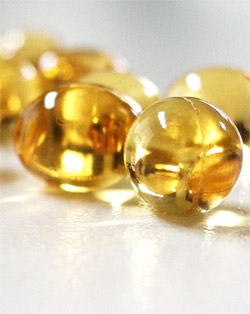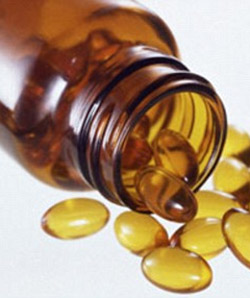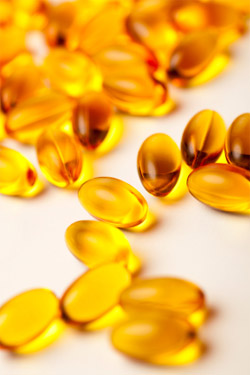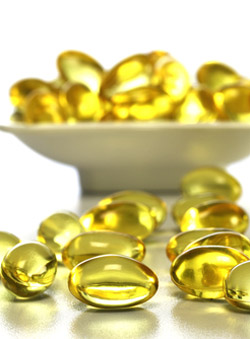|
|
Vitamin E Capsules: A Wonder Drug

Vitamin E is a vitamin that dissolves in fat. It is found in many foods
including vegetable oils, cereals, meat, poultry, eggs, fruits, vegetables, and
wheat germ oil. It is also available as a supplement. Vitamin E is used for
treating vitamin E deficiency, which is rare, but can occur in people with
certain genetic disorders and in very low-weight premature infants.
Some people use vitamin E for treating and preventing diseases of the heart and
blood vessels including hardening of the arteries, heart attack, chest pain, leg
pain due to blocked arteries, and high blood pressure. Vitamin E is also used
for treating diabetes and its complications. It is used for preventing cancer,
particularly lung and oral cancer in smokers; colorectal cancer and polyps; and
gastric, prostate, and pancreatic cancer.
Some people use vitamin E for diseases of the brain and nervous system including
Alzheimer's disease and other dementias, Parkinson's disease, night cramps,
restless leg syndrome, and for epilepsy, along with other medications. Vitamin E
is also used for Huntington's chorea, and other disorders involving nerves and
muscles.
Women use vitamin E for preventing complications in late pregnancy due to high
blood pressure (pre-eclampsia), premenstrual syndrome (PMS), painful periods,
menopausal syndrome, hot flashes associated with breast cancer, and breast
cysts.
Sometimes vitamin E is used to lessen the harmful effects of medical treatments
such as dialysis and radiation. It is also used to reduce unwanted side effects
of drugs such as hair loss in people taking doxorubicin and lung damage in
people taking amiodarone.
Vitamin E is sometimes used for improving physical endurance, increasing energy,
reducing muscle damage after exercise, and improving muscle strength. Vitamin E
is also used for cataracts, asthma, respiratory infections, skin disorders,
aging skin, sunburns, cystic fibrosis, infertility, impotence, chronic fatigue
syndrome (CFS), peptic ulcers, for certain inherited diseases and to prevent
allergies.
Some people apply vitamin E to their skin to keep it from aging and to protect
against the skin effects of chemicals used for cancer therapy (chemotherapy).
The American Heart Association recommends obtaining antioxidants, including
vitamin E, by eating a well-balanced diet high in fruits, vegetables, and whole
grains rather than from supplements until more is known about the risks and
benefits of taking supplements.
Vitamin E is important for protecting cell membranes.
Vitamin E supplements have become popular as antioxidants, substances that
studies suggest may help protect cells from damage. The British Dietetic
Association says some phytochemicals such as flavonoids, glucosinolate and phyto-oestrogens
'act as antioxidants, which may reduce damage to cell DNA and cell membranes.
However, whether there are clear benefits of antioxidants remains unclear.
Vitamin E uses
Many people use vitamin E supplements with the hope that the vitamin's
antioxidant properties will prevent or treat disease. Early laboratory studies
of vitamin E supplements were promising, but studies of vitamin E in people have
been disappointing. Studies of vitamin E for cancer, heart disease, diabetes,
Alzheimer's disease, cataracts and many other conditions have been inconclusive
and more research is needed.
So far, the only established benefits of vitamin E supplements are in people who
have an actual deficiency. However, vitamin E deficiencies are rare. They're
more likely in people who have diseases, such as digestive problems and cystic
fibrosis. People on very low-fat diets may also have low levels of vitamin E.
Vitamin E dose and instructions for use
 The NHS says the amount of vitamin E you need is: The NHS says the amount of vitamin E you need is:
4mg a day for men
3mg a day for women
The tolerable upper safe levels of a supplement are the highest amount that most
people can take safely. Higher doses might be used to treat vitamin E
deficiencies but you should never take more unless a doctor says to do so.
For adults the upper safe level for vitamin E is 540mg/day.
Because vitamin E is fat-soluble, supplements are best absorbed with food.
Vitamin E food sources
Most people get enough vitamin E from food. Good sources of vitamin E include:\
-
Vegetable oils, such as olive and soya
-
Green leafy vegetables, such as spinach
-
Fortified cereals and other foods
-
Eggs
-
Nuts
Vitamin E supplement information
Vitamin E is available in tablets, capsules and liquids. It's standard in
multivitamins. Vitamin E is also sold as a topical ointment. Like any
supplement, keep vitamin E supplements in a cool, dry place, away from humidity
and direct sunlight. There are eight different types of vitamin E. Alpha-tocopherol
is the most common. It's also the most active form.
Vitamin E warnings
Side effects. Topical vitamin E can irritate the skin. Overdoses of vitamin E
supplements can cause nausea, headache, bleeding, fatigue and other symptoms.
Interactions. People who take blood thinners should not take vitamin E
supplements without talking to their doctor first. If you take any medication,
it's best to check with your doctor to make sure vitamin E supplements won't
interfere.
Risks. Vitamin E supplements have unclear benefits and risks, so don't use them
in high doses or for the long term unless your doctor suggests it.
Vitamin E is considered to be as a wonder drug not only because it helps in
treating circulatory problems such as heart disease, varicose veins and high
blood pressure but it equally beneficial for your skin and hair as well. Vitamin
E is also known as alphatocopherol.There are several different ways to use
vitamin E oil and capsule which are available in any drug store.
Vitamin E Capsules for Soft Skin
You can use vitamin E oil as a night cream once in a week for baby soft skin.
Warm the vitamin E oil (Warm the bottle of vitamin E oil by letting it sit in
hot water for few minutes)and take 5 drops of the oil in the palm of your hand
and apply it on your face. Massage it for few minutes. Don't forget to pat it
gently under your eyes and massage it on your lips too. Wash it off with water
in the morning. You can use vitamin E capsules also if you don't have the oil.
Apply this oil no more than twice a week as you may find it sticky and oil may
clog pores. Because of its antioxidant activity, vitamin e is vital on
protecting skin cells and fights with elements which produce cell damaging free
radicals.
Vitamin E for Burn wounds
Vitamin E is considered to heal small burn wounded area. Don't apply till the
area gets cool. Apply the oil on the affected area and rub it very gently.
Vitamin E For Stretch marks
Vitamin E is pretty good for healing scars and stretch marks. All you have to do
is to just buy the capsule, cut them open and apply it on the affected area.
Apply this twice a day until the marks gets faded. Of course it takes months and
sometimes even a year to heal those terrible stretch marks but for pregnant
ladies this is an ultimate solution after their delivery.
Vitamin E For Eczema and psoriasis
Can be cured by applying the vitamin E oil twice a day to the affected area till
it gets cured.
Vitamin E For Skin cancer
 This is very important for those who spend most of their time outside under the
scorching heat of this sun. Vitamin E oil protects the skin from skin cancer.
Just adds 4-5 drops of this oil on your sunscreen and then apply it on your
skin. This is very important for those who spend most of their time outside under the
scorching heat of this sun. Vitamin E oil protects the skin from skin cancer.
Just adds 4-5 drops of this oil on your sunscreen and then apply it on your
skin.
Homemade Vitamin E oil
You can make your own vitamin E oil by adding few capsules of vitamin E into a
bottle and mixing one tbsp. of olive oil into it. Mix it well before applying.
Massage your body with this oil and get glowing skin.
Vitamin E for shiny hair
Cut the vitamin E capsule and squeeze it in your palm and then massage it on
your hair .Regular use of these capsules makes your hair shiny and damage free.
It is believed that using vitamin E in your hair speed up the hair growth
process as well.Read about home made hair pack for long and healthy hair .
Vitamin E after sun moisturizer
Vitamin E is a great after sun moisturizer. When you get out of the sun just
take a shower and apply the oil when the skin is still wet.
Vitamin E for Hair repair
Vitamin E capsules cure dry hair and split end problem. Take 20 capsules
(depends upon your hair length and damage) ,cut them and put the gel into a
small bowl. Now apply on the end of your damaged hair and keep it for an hour.
Apply the gel thoroughly on your hair. Rinse it off with shampoo as usual and
see the difference with in a month or so. This is a wonderful remedy for those
who color their hair or use curler and straightener frequently.
Vitamin E for Wrinkles & Age Spots
Vitamin E oil helps in removing age spots and liver spots. Also, vitamin E oil
helps in reducing the sign of aging by fading away wrinkles. Vitamin E
contributes in healthy circular system and aids in proper blood clotting.
Vitamin E should be taken daily and best source of it lies in our kitchen.
Instead of depending upon the capsules for intake you can include mangoes,
papaya, avocado, wheat germ, nuts and pea nut butter into your diet.
The majority of vitamin E's benefits stem from its antioxidant qualities. That
means it combines with oxygen and destroys free radicals. It protects
polyunsaturated fats and other oxygen-sensitive compounds such as vitamin A from
being destroyed by damaging oxidation reactions.
Vitamin E and Antioxidation
Vitamin E's antioxidant properties are also important to cell membranes. For
example, vitamin E protects lung cells that are in constant contact with oxygen
and white blood cells that help fight disease.
But the benefits of vitamin E's antioxidant role may actually go much further.
There is significant evidence vitamin E can protect against heart disease and
may slow the deterioration associated with aging. Critics scoffed at such claims
in the past, but an understanding of the importance of vitamin E's antioxidant
role may be beginning to pay off. However, as with betacarotene, the effect of
vitamin E in preventing heart disease may be both timing-sensitive and dose
sensitive.
Vitamin E also acts as an antioxidant in foods. The vitamin E in vegetable oils
helps keep them from being oxidized and turning rancid. Likewise, it protects
vitamin A in foods from being oxidized. This makes vitamin E a useful food
preservative.
The Therapeutic Value of Vitamin E
As an antioxidant with a powerful punch, vitamin E helps prevent cancer, heart
disease, strokes, cataracts, and possibly some of the signs of aging. Vitamin E
protects artery walls and keeps the "bad" low-density lipoprotein (LDL)
cholesterol from being oxidized. Oxidation of LDL cholesterol marks the
beginning of clogged arteries. Vitamin E also keeps the blood thin by preventing
blood platelets from clumping together. High levels of vitamin E in the body
decrease the risk of a non-fatal heart attack or stroke in most people.
 A dynamic cancer fighter, vitamin E protects cells and DNA from damage that can
turn cancerous. It reduces the growth of tumors while enhancing immune function
and preventing precancerous substances from being turned into carcinogens.
Studies with mice show that vitamin E applied to the skin may help prevent skin
cancer resulting from exposure to ultraviolet radiation. A dynamic cancer fighter, vitamin E protects cells and DNA from damage that can
turn cancerous. It reduces the growth of tumors while enhancing immune function
and preventing precancerous substances from being turned into carcinogens.
Studies with mice show that vitamin E applied to the skin may help prevent skin
cancer resulting from exposure to ultraviolet radiation.
Women who suffer from fibrocystic breast disease can often find relief with
vitamin E supplementation. Fibrocystic breast disease is characterized by
painful breasts, sometimes with benign lumps or swelling, starting several days
before the menstrual period. Researchers aren't sure why vitamin E helps this
condition, but numerous studies indicate that it does.
Vitamin E can be beneficial to people with diabetes. It enhances the action of
insulin and improves blood glucose metabolism by reducing oxidative stress.
This humble nutrient keeps the nervous system healthy by protecting the myelin
sheaths that surround nerves. It also appears to prevent mental degeneration due
to aging, possibly including Alzheimer disease.
Athletes need to get adequate amounts of vitamin E. The body's own metabolism
creates free radicals during excessive aerobic exercise. Vitamin E reserves make
sure these free radicals don't get out of hand and cause trouble. Vitamin E
therapy also treats claudication-pains in the calf muscles that occur at night
or during exercise. Premature babies receive vitamin E to reduce or prevent
oxygen damage to the retina of the eye as a result of artificial ventilation.
Ongoing animal studies suggest that vitamin E may limit lung damage caused by
air pollution. It appears that vitamin E can reduce the activity of such common
air pollutants as ozone and nitrogen dioxide.
Vitamin E applied to cuts may very well increase the healing rate because it
minimizes oxidation reactions in the wound and also keeps the wound moist. Many
women report that vitamin E helps reduce hot flashes and other symptoms of
menopause. Though vitamin E can slow down the oxidation of fats that occurs in
aging, experimental studies have not shown it to increase the life span of
animals. Neither has it been shown to control such signs of aging as wrinkled
skin or gray hair.
However, the vitamin may indeed delay or prevent some diseases or a loss of
function related to aging. Recent studies have reported improved short-term
memory in older adults who took supplemental vitamin E. While vitamin E may not
make you live longer, it may help you live a little better as you get older.
A recent study by US Scientists at Ohio State University has found out that when
quitting smoking, taking vitamin E capsules help. Apparently, vitamin E capsules
taken in the correct quantity, help in improving the blood vessel function which
thereby help in bringing an ex smoker's risk of getting a cardiovascular disease
to a non smoker's risk level.
Videos
Dated 16 August 14
|
|
|
|
|









